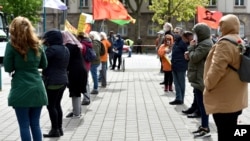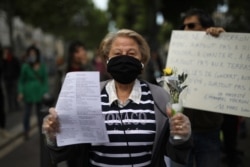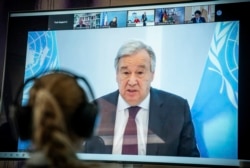Workers’ Day demonstrations that are traditionally held on May 1 throughout the world are being disrupted by the coronavirus pandemic.
Workers across the globe usually turn out en masse in observance of International Workers’ Day, also known as Labor Day. This year, however, worldwide stay-at-home orders and other travel restrictions triggered by the pandemic forced event organizers to make other plans.
Some European events were canceled, but in Spain, hard-hit by COVID-19, labor unions were holding online events after the courts struck down plans to host them outdoors.
Many unions in Germany also shifted from public demonstrations, instead broadcasting speeches and music on the internet and on local radio stations. However, one protest in a Berlin square drew hundreds of people in defiance of a ban on gatherings of more than 20 people.
In France, union demonstrations and the street sale of lily of the valley, two Workers’ Day traditions, have been disrupted, prompting President Emmanuel Macron to say this Labor Day is “like no other.”
In the United States, some workers at Amazon, Target and Instacart staged protests and sickouts Friday to protest working conditions that have become more hazardous during the pandemic. The workers are demanding hazard pay, sick leave, unpaid time off work, cleaning supplies and protective gear.
Protesters in New York City demonstrated by driving their cars through a largely empty Times Square, honking their horns and displaying banners. They called on the government to protect workers’ rights and provide financial help.
More than half of the 50 U.S. governors have taken steps to partially relax lockdown restrictions, while hoping a spike in infections won’t trigger another round of business closures.
Other U.S. governors, many of whom are Democrats, are taking a more guarded approach, trying to balance the need to reopen their state economies with concerns over the coronavirus that has claimed the lives of more than 63,000 people in the U.S., more than any other country.
As some U.S. governors push to relax restrictions after Thursday’s expiration of White House distancing guidelines, the top U.S. infectious disease expert, Anthony Fauci, warned them to avoid lifting state limits prematurely.
“Obviously you could get away with that, but you’re taking a really significant risk,” Fauci said Thursday on CNN.
Another warning came in a report by the University of Minnesota, which said the pandemic could last two more years. The report, released Thursday by the university’s Center for Infectious Disease Research and Policy, warned that the U.S. should prepare for a decline in infections followed by a spike as early as this fall.
The U.S. Food and Drug Administration granted an emergency use authorization for the antiviral drug remdesivir, clearing the way for more hospitals to use the drug. Recent clinical data show the drug might be a promising treatment for the coronavirus.
The leader of the United Nations said in an interview with the BBC that it is a tragedy that the world’s leaders have not been able “to come together to face COVID-19 in an articulated coordinated way.”
“Each country went with its own policy, different countries with different perspectives, different strategies and this has allowed the virus to spread,” said Secretary-General Antonio Guterres.
“It’s obvious we lack leadership” in the fight against the virus, he said.
The U.N. estimates that 8 percent of the world’s population, about 500 million people, could be forced into poverty by year’s end because of the devastation brought by the virus.
As countries consider how and when to reopen, India, the world’s second-most populous country, said Friday it would extend its nationwide lockdown for two more weeks after Monday. But the country’s ministry of home affairs said “considerable relaxations” would be allowed in lower-risk areas, including the manufacturing and distribution of essential goods between states.
Many European countries have begun gradually reopening or have plans to do so in the coming days. The economy in the eurozone – European countries that use the common euro currency – shrank a record 3.8 percent in the first quarter of the year.
In Britain, health minister Matt Hancock announced Friday the country has hit its target of carrying out 100,000 COVID-19 tests a day. Prime Minister Boris Johnson said Thursday that Britain is past the peak of the coronavirus outbreak and that cases are declining. The coronavirus has killed more than 27,500 people in Britain and infected about 178,700.
Italy, Spain and France on Friday reported declines in deaths from the virus, down from the peaks of their countries’ outbreaks.
The global tally of coronavirus cases continues to creep upward.
The Johns Hopkins Coronavirus Resource Center in the U.S. said Friday there were more than 3.3 million confirmed cases worldwide with about 238,000 deaths.
In addition to leading the world in fatalities with more than 64,000, the U.S. leads in the number of reported cases. Johns Hopkins says the U.S. has more than 1.1 million COVID-19 cases, about a third of the world’s total.









